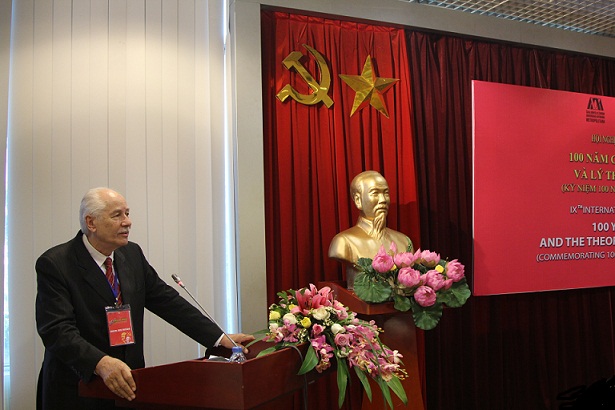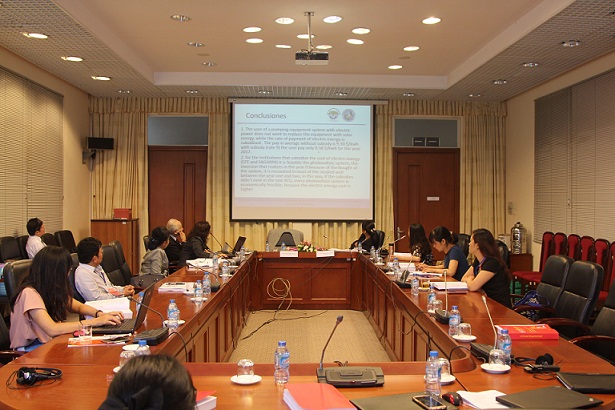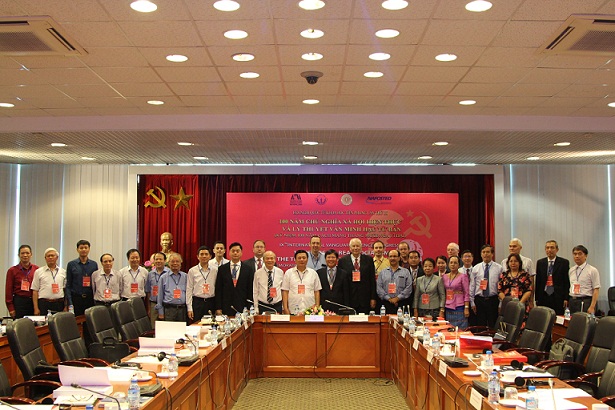Attending the workshop, On the international side, Prof.Dr. Heinz Dieterich, Chairperson of the Association of World Political Economy (WAPE), President of the World advanced research project (WARP), and with the participation of scientists, experts and scholars from leading universities and institutes in China, Laos, Singapore, the Federal Republic of Russia, the United Kingdom, the Federal Republic of Germany, Norway and Mexico.
In particular, representatives of the Russian and Mexican embassies in Vietnam were also present.
On the Vietnamese side, there were the participation of Prof.Dr. Nguyen Xuan Thang, Member of the Central Committee of the Communist Party of Vietnam, Director of the Ho Chi Minh National Academy of Politics (HCMA), Vice Chairman of the Central Theoretical Council; Prof. Dr. Nguyen Quang Thuan, President of the Academy, Vice Chairman of the Central Theoretical Council and other Vice Presidents of the Academy: Associate Prof. Dr. Bui Nhat Quang, Alternate Member of the Central Committee of the Communist Party; Associate Prof. Dr. Pham Van Duc and with the participation of experts and scientists from the research institutes of the Vietnam Academy of Social Sciences, the Ho Chi Minh National Academy of Politics, the Central Theoretical Council, the Communist Review and other universities and institutes.
On behalf of the Academic Leadership, opening remarks at the workshop, Prof.Dr. Nguyen Quang Thuan warmly welcomed the attendance of the participants; At the same time, he highly appreciated the historical value and era meaning of the Russian October Revolution on the world level and the achievements of socialism had become reality in the Soviet Union and Eastern European countries. Accordingly, Prof. Thuan affirmed that the October Revolution in Russia played the leading role in the history of modern humanity and was a shining example of encouraging and motivating the peoples all over the world to build a society for human beings. In addition, Prof.Dr. Nguyen Quang Thuan also analyzed the opportunities and challenges of the Fourth Industrial Revolution for the development of socialism; wishing that, through the workshop and follow-up activities, international and Vietnamese scientists continue to have deeper and more comprehensive studies from all perspectives on realistic and prospects of Socialism in the 21st century in the context of the Fourth Industrial Revolution, aiming to promote increasingly effective scientific cooperation.
|
|
|
 |
In the welcome speech of the workshop, as well as in his report, Prof. Heiz Dieterich, President of WARP, outlined the necessity of a post-capitalist civilization after the Soviet socialist model of 20th century socialism collapsed and the capitalist civilization based on the market economy that is always at potential risk of crisis and is not capable of solving the problems that humanity is facing today such as inequality, the gap between the rich and the poor, unemployment, climate change, habitat destruction... Socialism of the 21st century must be the socialism based on the most advanced achievements of the development of modern science and technology, the non-humanist market economy must be replaced by a " comparable economy" non-monetary basing on working time. The task of building a post-capitalist civilization must be the effort of the socialist countries under the leadership of the Vanguard revolutionary Party… The combination of revolutionary parties with advanced scientific theory based on the achievements of modern science and the fourth industrial revolution will be an important factor in the formation of post-capitalist civilization. Instead of dreams of each individual ethnic and nation, let us reflect together about the dreams of all humanity, striving for the true humanistic purposes of the whole of humanity. As such, WARP President emphasized the need for a strategic orientation for society and humanity, so the socialist countries must unite, creating the power to help other countries wish to participate in the movement of human development.
In the workshop report, Prof.Dr. Pham Van Duc, Vice President of the Academy emphasized the important meaning of the seminar’s theme, which not only showed the deep concern of the leaders of the Academy and the Vietnamese academics for the development of a socialist model suitable for Vietnam, but also expressed the enthusiasm of the international research community on the hot issues of development practice in human society today.
Basing on the study and synthesis of speeches, the Vice-President of the Academy highlighted the main contents of the workshop:
1 / Russian October Revolution: the lesson of history and current meaning.
2 / Socialist model of the 20th century and lessons learned for the socialist construction process of the 21st century.
3 / Innovation and the cause of socialist construction in Vietnam
4 / China's Policy of "One Belt, One Road " in the Process of Socialist Reform in China: Opportunities, Challenges and Issues for Vietnam and the Modern World.
5 / Socio-economic models and social innovation trends for the realistic socialist construction in Laos, Korea, Cuba, Latin American model (XXI century) and some other countries in the world: success, experience and challenges.
6 / Post-capitalist civilization and the future of socialism of the 21st century.
7 / The impact of the Fourth industrial revolution on the process of building post-capitalist civilization and development orientation of the socialist model of the 21st century.
8) New world order and geopolitical issues with the rise of China and Russia's return in the process of globalization.
 |
Under the chairmanship of Prof.Dr. Pham Van Duc and Prof. Heinz Dieterich, two plenary sessions drew the attention of experts through the very high-quality reports of the GS speakers. William Paul Cockshott, Glassgow University, UK; Assoc. Prof. Vo Dai Luoc, VASS; Dr. Stefan Rehfus, Federal Republic of Germany, Assoc. Prof. Dr. Luong Dinh Hai, Director of the Institute for Human Research, VASS; Prof. Gernot Ernst, University of Oslo, Norway; Prof. Konstantin Sivkov from National Russian Geophysical Research Institute, Russian Federation; Prof. Luo Yuding, Wuhan University, China; Prof. Dmitri Pletnev from Chelyabinsk University, Federal Republic of Russia. These scholars have addressed the issues of Big Data and supercomputers (the foundation of technological communism); Governance under the Marx-Darwin-CTS model and China's transforming (transitional) socialist model: (productive forces, class conflicts, and the role of the Vanguard Party); Capitalism (crisis, adjustment and adaptation); Threat to the socialist brain (the neuroscience foundation for collective behavior); The geo-strategic situation of the world superpowers and the global military-political trends of evolution in the world system; development in terms of the soft power of the socialist states ....
 |
|
 |
Discussion activities at sub-committees
|
|
|
 |
Besides, the conference was also divided into subcommittees for discussing issues such as: Sub-committee 1, real socialism; Sub-committee 2, the 4.0 technology revolution, the Vietnamese social practice and international issues; Sub-committee 3, Russian October Revolution and the practice of socialist construction in Vietnam. The exchanges of experiences and debates of international and Vietnamese scholars on relevant issues suggested new research directions that would contribute to the development of both theory and practice about Socialism as well as the future of human civilization. The valuable presentations by Vietnamese scholars have partly helped international scholars to realize that the success of Vietnam's renovation has added new details to the way, to build socialism for those countries that have taken the "short" transition, not through the stage of capitalist development; Vietnam insisted that Marxist perseverance did not mean to apply in a purely mechanical way but to apply scientifically and creatively their ideas in new historical conditions. The creativity in manipulation, the addition and perfection of the Marxist principles in accordance with the new historical context of the times, are the right way to protect Marxism, to persevere in pursuit of the Marxism.
The frank exchange of international scholars also provides Vietnamese scholars with multi-dimensional assessment and views on Marxism, socialism, capitalism, neo-liberalism, market economy, post-capitalist civilization....
After two days of exciting and fruitful work, the workshop ended successfully. The conference was also a forum for exchanging scholarships and sharing useful experiences of Vietnamese and international experts and scholars, thus contributing strongly to the scientific cooperation and scientific research organization to carry out projects, towards peace and sustainable development in the future.
Nguyen Thu Trang







